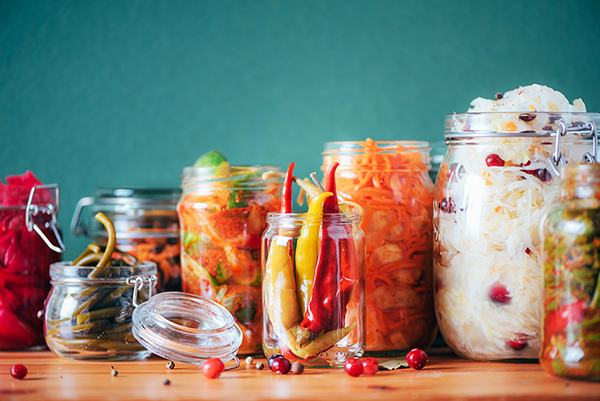




Q: I’m allergic to dairy so I can’t rely on probiotics from yogurt or kefir. What do you recommend instead for people like me who can’t have dairy?
A: Dairy isn’t the only source for probiotics. There’s a wonderful world of lacto-fermented foods that are good sources of beneficial organisms for bowel regularity, colorectal health, immune and skin health, as well as anti-cancer, anti-obesity and brain health.
It is important to note, however, that probiotic foods aren’t recommended in the setting of yeast overgrowth (candida) or illness due to exposure to mold. If you are suffering from any such conditions, it’s best to avoid these foods for a period of time on the advice of your qualified nutritionist or other healthcare practitioner.
One of my all-time favorite probiotic foods is kimchi. This is a traditional Korean food comprised of vegetables fermented with probiotic lactic acid bacteria. Kimchi is typically made from cruciferous vegetables such as cabbage seasoned with other functional foods like ginger, garlic and red pepper. Use it as a small side dish or a condiment with your main courses, or enjoy it as an appetizer like I do.
Another fermented cabbage dish is sauerkraut. Rather than canned or plastic, look for good quality European sauerkraut stored in glass jars. The only ingredients should be fermented cabbage and salt, nothing else. Make sure it’s not pasteurized as this will kill the beneficial bacteria.
Pickles fermented in brine (not vinegar) contain probiotic organisms. The cucumber isn’t the only vegetable you can pickle. Try carrots, cauliflower, squash, turnips and onions. Here’s a link to get you started making your own: Sour Pickles by Nourished Kitchen
Miso is made of fermented soybeans and typically used in soups and stews in Japanese cuisine. It adds a nice umami flavor to foods and just a little bit goes a long way.
Kombucha is an effervescent drink usually made from green or black tea. However, these beverages may contain a small amount of alcohol (0.5% to as much as 3%) and most are sweetened. Consumer beware!
And don’t forget your prebiotics. Prebiotics feed and nourish our healthy flora and are an important part of overall wellness. Some prebiotic foods are onions, garlic, leeks, asparagus, Jerusalem artichoke and dandelion greens.
Making these foods a part of your daily diet will nourish your microbiome and fortify your immunity. And your gut will be very happy too!
Of course, if you’re concerned about meeting your probiotic needs, you can always supplement your dietary intake with a high-quality probiotic like Dr. Ohhira’s.
To your health!
Though we think of declining estrogen as the hallmark of menopause, it's actually common for…

Up to 12 percent of Americans have ulcers at some point in life. Peptic ulcers…
Gallbladder disease is a modern illness. An estimated 20 million Americans have gallbladder disease. The…

There’s more to GI health than whether or not to take an acid-blocker. All too…

In the latest attempt to remove “stigma” from medical terminology, liver specialists have come up…

Q: My husband’s high sensitivity C-reactive protein (hs-CRP) is 1.62 and his homocysteine is 13.1. If…

Banish the Bloat: Leyla Weighs In with Tips and Insights

Our virtual voicemail is open 24/7, so there's no need to wait to submit your questions for Dr. Hoffman. Leave a message, and you may hear your question featured on the Intelligent Medicine radio program!